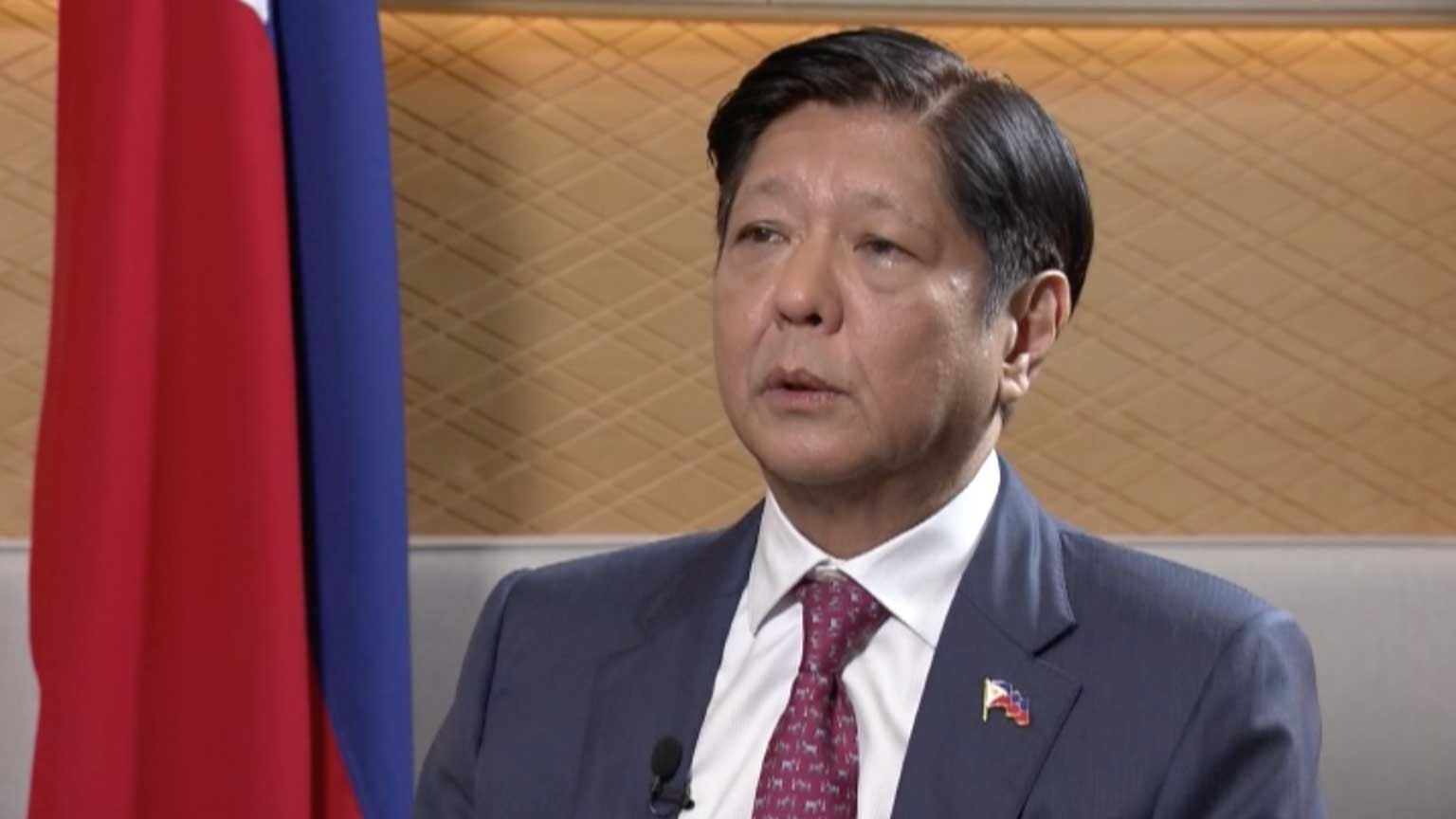Sakai Noriyuki: Could you tell us your outlook or expectations for the next 50 years between ASEAN and Japan?
Ferdinand Marcos Jr.: I think the evolution that we've been undergoing will continue. Ties between ASEAN and Japan started as a trade agreement. Now, however, there is a geopolitical aspect to that relationship.
The situation in the South China Sea has grown increasingly complicated. In the same way that economic partnerships help strengthen all member participants, diplomacy does the same in the geopolitical world. All of us are working to maintain the peace and ensure sea and air traffic in the South China Sea remains free flowing.
We follow the rules-based structures that have been in place in most of the world. And, of course, we will continue to implement and enforce the United Nations Convention on the Law of the Sea. That will not be done by one country alone ― not by the Philippines, not by Japan ― but by the cooperation of all of the countries that we consider to be actors in this new dynamic we must navigate.
Sakai: We've seen lots of Chinese aggression in the South China Sea recently. Do you think China is trying to change the status quo there by force?
Marcos: I don't know if it is by force, but certainly China is imposing its view on the baselines, on the economic zones of the countries around the South China Sea ― especially when it comes to the Philippines. Tensions have increased rather than diminished over the past months and over the past years. That's why we have to continue to counsel peace and continue communication between the countries involved. The South China Sea situation is the most complex geopolitical problem that the world faces.
The war in Ukraine is a tragedy, but it is simpler to understand than the many different moving parts that are involved in the dynamic here in the South China Sea. These new problems will require new solutions.
I believe there is no country in the world that wants to go to war, at least certainly not in Asia. So we must make it clear that we will maintain the peace and how that's going to be done, while being sensitive to or being aware of other countries' concerns and agendas. That is where the art of diplomacy will have to come into play.
I can't say we've found the answer yet. We're still trying to formulate that answer. And things are moving very quickly in many parts of the South China Sea, so approaches are changing.
Let me give you an example using ASEAN. The members of ASEAN all espouse peace, but they have different relationships with China. They also have different relationships with the United States, with Japan, with the Philippines and with ASEAN. This is something that we have to try to balance and be sensitive to everyone.
Now, of course, that's not an easy thing to do. These are things that are very important to each country. But we have to keep trying, and the Philippines for its part will always be there continuing to promote the idea of peace, the national interest of each country, and that's where we derive our policies in terms of foreign policy.
Sakai: Even if the rest of other ASEAN countries keep silent.
Marcos: It's inevitable. You'll find the same thing in the EU and in Latin America. People have different views, but the general principle of peace is something we hold close to our hearts. And it is a common desire for all countries, including those involved in this dynamic that we are now dealing with. We have to find a way. We cannot stop trying and we cannot stop doing everything that we can to promote peace.
Sakai: The Philippines was the first recipient of Japanese official security assistance. The Philippines purchased a security radar and it has begun operation. Do you have any comments on the move?
Marcos: I think it's just another example of the evolution. We started as an economic alliance ― to open our markets and to help each other with the transfer of technology. After the pandemic, we started talking about food supplies, about manufacturers and about critical medicines. And then, of course, there are the incidents that have been going on in the South China Sea.
The alliance with Japan is to help us work together more closely because we really have to train with one another to overcome the so-called interoperability between different forces. And it isn't sufficient for just Japan and the Philippines to enter such an agreement. We must get more of these arrangements in place. We have been talking about the trilateral agreement between the US, Japan and the Philippines. I think that there will be more such agreements in place, both multilaterally and bilaterally.
The signing of the OSA (Official Security Assistance) is a manifestation of how we are developing that relationship in response to what we feel are the needs of the day. It may be something we did not have to think about 20 years ago, but now we have to. These are the responses we need to be making so we can say we're preparing for every eventuality and we are able to act again to maintain peace, to maintain freedom of navigation, to keep trade routes open.
And that is the way things are going ― not just the economy, not just trade, but also diplomacy. We also talk about military interconnectivity. That is the pattern we are seeing emerge, that is how we are evolving.
Sakai: Japanese Prime Minister Kishida Fumio said the relationship between Japan and the Philippines is now in a golden age. What is your reaction to this?
Marcos: I have to agree with the prime minister. We no longer only talk about trade, or ODA or JICA (Japan International Cooperation Agency). We talk about other things as well. These are things that in the past we did not have to deal with, or that we didn't feel the need to make the arrangements that we now have made. There are several treaties, for example, between the Philippines and China. And there is the strategic alliance that we have entered into with Japan as well as the RAA (reciprocal access agreement), that provides equal access to each other's facilities.
These are some of the things we didn't have before. And our trade agreements continue to grow. And Japan has always been a very important partner for the Philippines in terms of infrastructure development and transfer technology. That importance has continued to grow.
But the new areas that we've started to explore are ones in which we were not involved with before, at least at the government level. And that is an indication that your prime minister is right in his assessment that the health and robustness of our relationship has reached a new high.
Sakai: Let me ask you about oil exploration in the South China Sea. Malampaya is running out soon. Are we expecting dredging in the West Philippine Sea to push through?
Marcos: We are still in a deadlock right now. It's in a conflict area. So that's another thing that we have to try and resolve to see what role any country plays. Of course, it's still the official position of the Philippines that this is not in a conflict area. This is very clearly within our EEZ. It is certainly within our baselines, within the maritime territory of the Philippines. So whatever it is that we will do in the future, it has to be consistent with that understanding.
We have been in negotiations for over three years now, and have made very little progress. And I'm sorry to admit that the supply of LNG is becoming more and more important to the Philippines. We are seeing LNG as being the transition from purely fossil fuels coal to a bigger mix of renewables. But the move to renewables, as we're all discovering, is not as easy as we had hoped. So we need a transition period to give ourselves time to bring the infrastructure in, to allow the technologies to develop.
Some of the new technologies are still being piloted, so we have to wait to see if they're going to be actually rolled out in a commercial basis. That will take a little time and during that time we need to have a sufficient fuel supply, especially with all the plans that we have for economic growth.
The supply of reliable, affordable power is always going to be critical. And it has been one of the problems that the Philippines has faced in terms of higher prices for power and a lack of supply. So that's what we'll be working on, and why LNG has become increasingly important.
It's imperative for the Philippines to find a way to move the process forward so as to be able to assure ourselves of a fuel supply during that transition period. And it will not be the same fuel supply. We are hoping to grow the fuel supply because industrialization is almost directly dependent on the power supply and its pricing. It's critical to all of our plans that we are able to attend to that problem.
Sakai: Sierra Madre (Stranded warship used by the Philippines as a military facility) in Ayungin Shoal (Second Thomas Shoal) has deteriorated. Recent reports say that the US has been cooperating with the Philippines to come up with measures to maintain Manila's hold in the area. Is it true that the US, which is a treaty ally, is now helping the Philippines?
Marcos: The US has been assisting us in patrolling the sea lanes. But as far as the Philippines is concerned, the situation with the Sierra Madre is a purely Filipino concern. Because of that we have moved unilaterally in doing whatever it is we can to maintain the presence in Ayungin Shoal and ensure we can resupply our people there so that they can maintain our presence. The most I would say is that the Americans are conducting joint cruises in the vicinity. But it's not just the US. It's also Japan. It's also (South) Korea. It's also Australia. Canada also sometimes comes in. Once in a while some of the European countries send their own ships. So it's really a concerted effort. It's not just the US. Perhaps the US has the highest profile. But in the specific case of Ayungin Shoal, the Sierra Madre, we consider it a Philippine problem and we intend to solve that problem ourselves.

